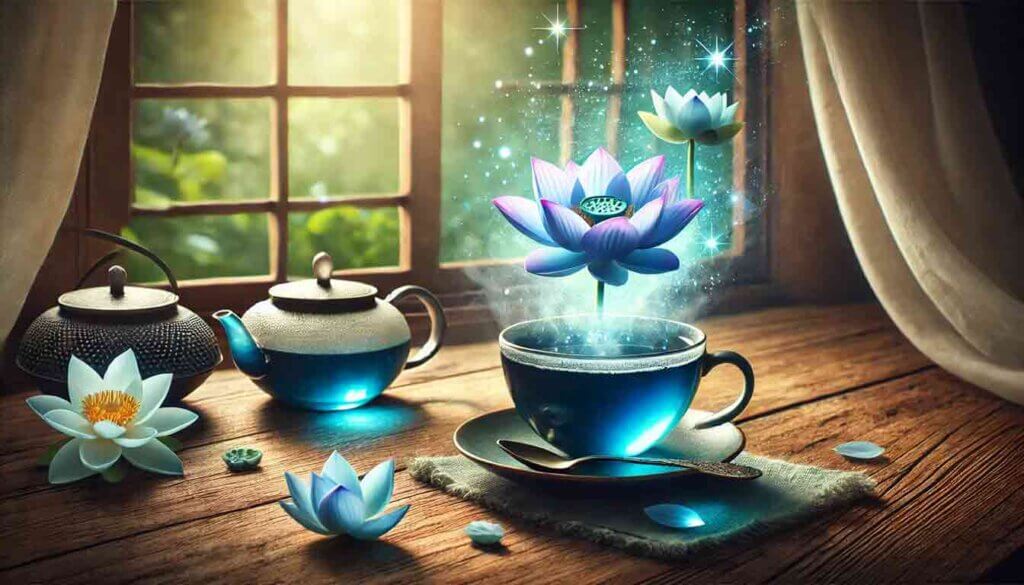Blue Lotus tea, derived from the Nymphaea caerulea flower, has regained popularity for its long-standing reputation as a calming herbal infusion that supports emotional balance. Historically revered across ancient Egypt, Greece, and parts of Asia, the flower was celebrated for promoting serenity, reflection, and gentle upliftment. Today, the tea crafted from its petals continues to attract individuals seeking a natural beverage that aligns with relaxation and emotional well-being. Without relying on caffeine or stimulating compounds, Blue Lotus tea provides an approachable option for soothing the mind and easing tension, making it a favored choice in modern wellness circles.
Understanding Blue Lotus Tea: Origin, Tradition, and Modern Use
Blue Lotus has been deeply connected with spiritual symbolism and daily ritual for thousands of years. Egyptian art frequently depicted the flower as a representation of renewal, tranquility, and elevated consciousness. In contemporary practice, Blue Lotus tea is valued for its soft aroma, mild flavor, and association with calmness. Many people enjoy it as part of their evening routine, meditation sessions, or creative rituals because of its gentle and non-habit-forming nature. The beverage is embraced as a supportive herbal option for those seeking a soothing drink that complements personal wellness habits.
How Blue Lotus Tea Interacts with the Mind and Mood
The calming qualities traditionally linked to Blue Lotus tea are often attributed to the presence of compounds such as nuciferine and, in some references, trace levels of apomorphine. These natural constituents have been connected to relaxation and emotional balance in historical and anecdotal use, although scientific research continues to evolve. The effects of the tea are typically described as subtle rather than intense. Individuals often report mild emotional uplifting, a sense of quiet clarity, and a reduction in mental clutter. This supports a state of ease that can be particularly helpful during reflective tasks, creative pursuits, or moments of mental reset.
Many people who incorporate Blue Lotus tea into their routine find that it contributes to a smoother emotional landscape. It does not dramatically shift one’s mood but instead encourages a gentle elevation marked by ease, warmth, and lightness. Because of this, the tea is commonly consumed during times when emotional grounding is desired, helping create a space where calmness feels more accessible.
Blue Lotus Tea and Anxiety: A Gentle, Non-Medical Approach
Blue Lotus tea is often sought during periods of heightened stress or emotional strain due to its traditionally recognized calming properties. As a non-caffeinated herbal beverage, it supports relaxation without overstimulating the nervous system. Many individuals choose it when they want a natural way to unwind after a demanding day, prepare the mind for restful activities, or settle into a more centered state. By encouraging a quiet mental environment, it can support the body’s natural ability to release tension and restore equilibrium.
Rather than functioning as a clinical solution, the tea helps create conditions that make emotional ease more attainable. The warm temperature, gentle aroma, and sensory comfort of the drink itself contribute to a soothing experience. When used consistently as part of a relaxation routine, it can help reduce the intensity of anxious feelings by giving the mind space to decompress naturally.
Blue Lotus Tea and Sleep: Indirect Benefits for Mood and Anxiety
Many individuals incorporate Blue Lotus tea into their nighttime rituals because of its naturally calming qualities. A relaxing pre-sleep routine can significantly influence emotional stability and stress resilience. Since sleep plays a major role in shaping mood, energy levels, and cognitive clarity, anything that supports restful preparation can indirectly improve mental well-being. Blue Lotus tea is frequently enjoyed before bedtime, as its warmth and aroma help signal the body to slow down and transition toward rest.
The sensory appeal of Blue Lotus, especially its distinctive aroma, also contributes to a more tranquil atmosphere. When paired with slow breathing, reading, or meditation, the tea becomes part of a holistic relaxation practice that supports emotional balance. This multi-sensory effect enhances its value as a tool for calming the mind and alleviating anxious tension.
Potential Risks and Responsible Use
Although Blue Lotus tea is widely consumed as a traditional herbal infusion, it is not suitable for everyone. Individuals who are pregnant, breastfeeding, or taking certain medications should seek medical guidance before use. People with allergies to botanical plants should also approach it with caution. Using high-quality, ethically sourced Blue Lotus is essential to maintain safety and ensure the integrity of the herbal profile. Responsible consumption, mindful of dosage and frequency, ensures the tea can be enjoyed comfortably and safely.
How to Prepare Blue Lotus Tea for Optimal Benefits
Preparing Blue Lotus tea traditionally involves heating water to just below boiling, adding one to two teaspoons of dried petals, and allowing them to steep for several minutes. The resulting infusion can be enjoyed warm, allowing the full aroma and flavor to support relaxation. For many, the experience becomes even more valuable when combined with mindful practices such as meditation, gentle stretching, or journaling. These activities enhance the calming effects of the tea by creating a quiet, supportive environment for emotional release and reflection.
Why Blue Lotus Tea Appeals to Modern Wellness Enthusiasts
The growing interest in Blue Lotus tea reflects a broader shift toward natural, holistic approaches to stress relief and emotional balance. Modern wellness communities value beverages that support calmness without relying on stimulants or synthetic ingredients. Blue Lotus stands out due to its rich cultural history, unique sensory qualities, and gentle mood-supporting reputation. Its soothing nature makes it particularly appealing to individuals committed to mindfulness, stress reduction, and balanced living.
Conclusion
Blue Lotus tea remains an admired herbal infusion for its ability to promote calmness, emotional ease, and subtle mood enhancement. Rooted in centuries of traditional use and increasingly appreciated in modern wellness routines, it offers a natural complement to practices that support mental clarity and relaxation. While not a medical treatment, Blue Lotus tea provides a comforting experience that can become an integral part of daily rituals focused on grounding and emotional well-being. Through consistent, mindful use, it can help cultivate a calmer mental environment and support resilience against everyday stress.
FAQ’s
1: Does Blue Lotus tea really help with anxiety?
Blue Lotus tea is traditionally associated with calming effects, and many users report that it helps ease mild tension and promotes relaxation. While it is not a medical treatment for anxiety disorders, its soothing aroma and gentle herbal properties can support a calmer mental state when used as part of a relaxation routine.
2: Is Blue Lotus tea safe to drink daily?
Most people consume Blue Lotus tea in moderate amounts without issues, but daily use depends on individual sensitivity. Those who are pregnant, breastfeeding, on medications, or prone to allergies should consult a healthcare professional before making it a daily habit. Using high-quality, uncontaminated Blue Lotus is essential for safe regular consumption.
3: Can Blue Lotus tea improve sleep?
Blue Lotus tea is often used as part of nighttime rituals due to its naturally relaxing qualities. Many people find that drinking it before bed helps them unwind and transition into a more restful state. Although it does not act as a strong sedative, it can support better sleep by promoting calmness and reducing pre-sleep tension.
4: What does Blue Lotus tea taste like?
Blue Lotus tea typically has a mild, floral flavor with soft herbal undertones. Its delicate aroma and smooth taste contribute to its calming experience, making it a pleasant evening or meditation-time beverage. The flavor is subtle enough to enjoy on its own but can also be enhanced with honey or lemon.
5: How long does it take for Blue Lotus tea to work?
Most people notice the calming effects of Blue Lotus tea within 15 to 30 minutes, depending on how strong the infusion is and individual sensitivity. The relaxation tends to be gentle rather than intense, gradually creating a sense of ease that can support meditation, creativity, or unwinding after a stressful day.

